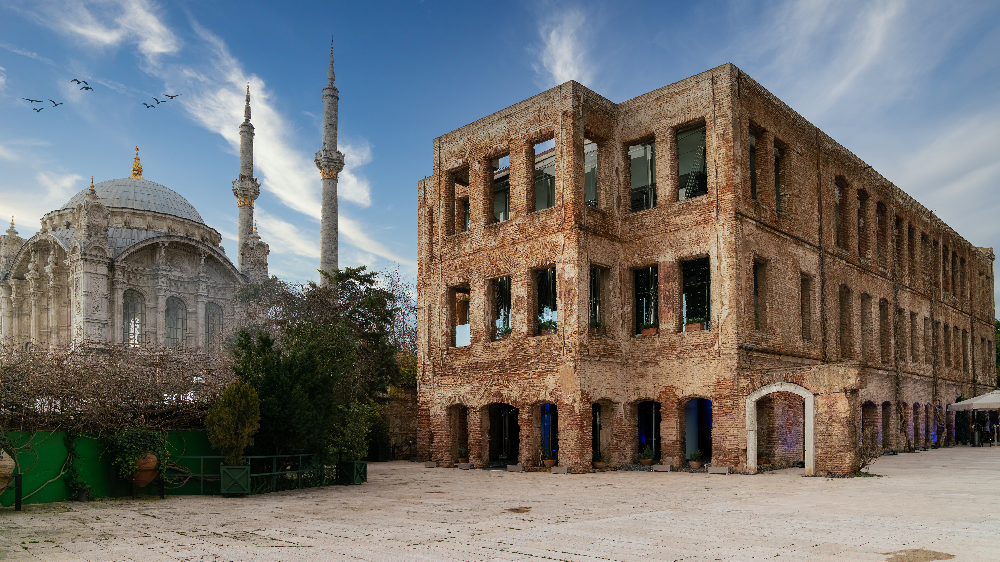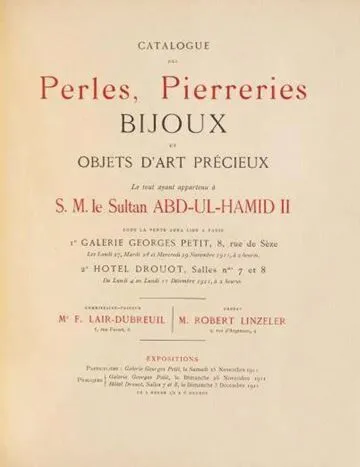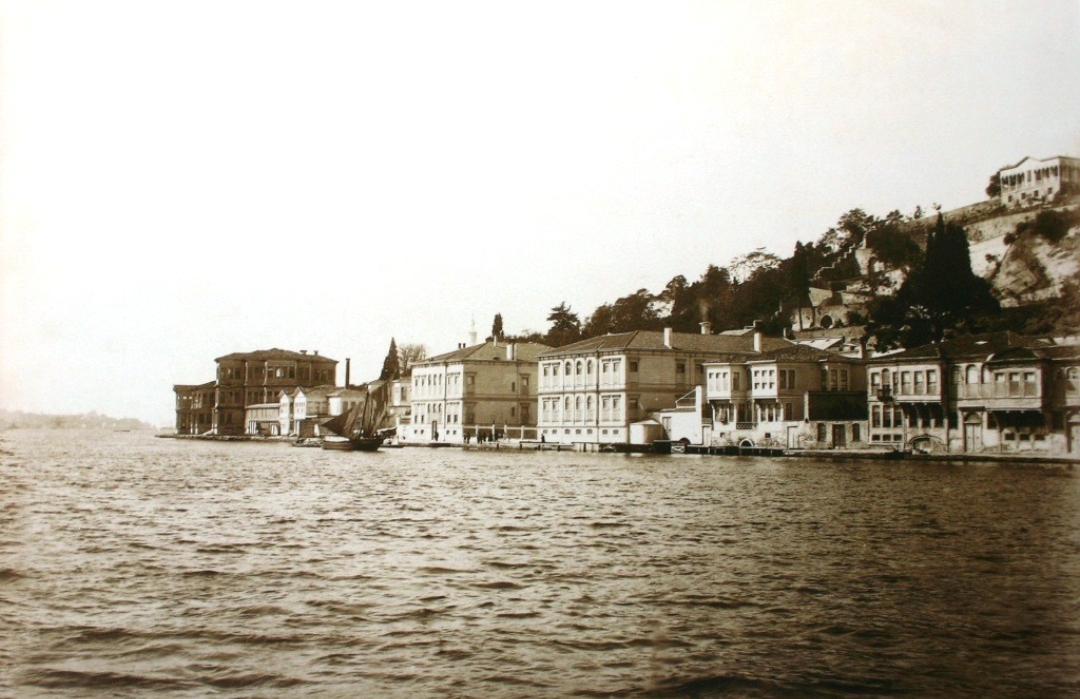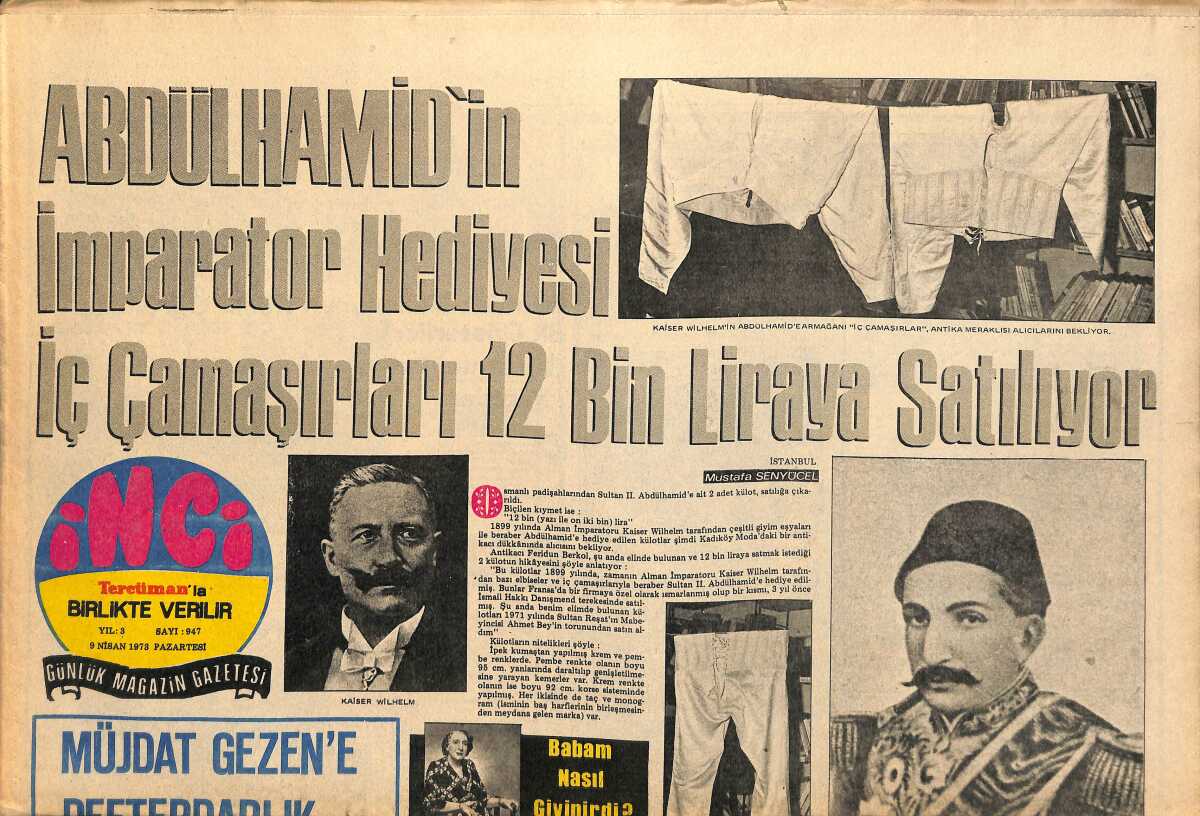.png)
THE WEALTH OF THE DYNASTY WAS PLUNDERED UNDER POLICE SUPERVISION!
Since coming to power in 1908, the members of the Committee of Union and Progress (CUP, also known as the Young Turks) realized that money was power, so they set their sights on wealth sources to maintain their rule. Moreover, as they could masterfully commit looting and theft in the name of the nation, like any other crime, they amassed an enormous fortune and the power that came with it, at the expense of others' tears. The personal properties of Sultan Abdulhamid II's officials, the dynasty, minorities, and members of the old regime, along with foundations (waqfs), became the inexhaustible source of this fortune.
The law of 1924, which exiled the Ottoman dynasty from their homeland, stated that their properties had to be liquidated within a year; otherwise, they would be sold by the government. This provision was contrary to the constitution, which protected personal property. These were properties purchased with the personal funds of the dynasty, not state money.
Members of the dynasty, during the three-day period granted for their exile, sold their movable belongings at bargain prices or distributed them to friends and relatives. During this time, unpleasant incidents also occurred. Shahzade Seyfeddin Efendi's house in Kuruçeşme was looted by the public under police supervision, and even the police participated in the looting.
The Good and the Bad
Some transferred their properties to trusted individuals, hoping to benefit from the rent while in exile and reclaim them when they returned. However, very few achieved what they hoped for. When the owners returned from exile, their properties were gone for good.
Shahzade Nihad Efendi transferred his mansion in Serencebey to a friend from Galatasaray High School. This friend, a model of loyalty, regularly sent a specified rental fee every year. Before his death, he bequeathed to his child that the mansion belonged to the prince. When the heirs of the prince returned in 1974, the now-dilapidated mansion was sold at a bargain price, and the proceeds were divided.
Sultan Mehmed VI's mansion in Çengelköy, inherited from his princely days, was transferred to a loyal servant named Zehra Hanım. When Sultan’s daughters Sabiha and Ulviye Sultan returned, Zehra Hanım’s brother took over one-third of the land in exchange for turning a blind eye. As a result, the mansion was sold at a bargain price, and the sultans received very little money.
When Sabiha Sultan left, she gave power of attorney to Refik Bey, the director of the Imperial Treasury. Later, 150 people were exiled because of their loyalty to the old regime and unfortunately Refik Bey was one of them. She lost her mansion in Teşvikiye and her waterfront house at the foot of the bridge in Rumelihisarı.
Shahzade Ziyaeddin Efendi’s mansion and garden behind Haydarpaşa station, which now houses an entire neighborhood, were also seized. The waterfront mansions belonging to sultan ladies from Ortaköy to Kuruçeşme were all scattered.
Some were unable to transfer their properties. They gave power of attorney to others, but very few of these trustees remained loyal. Some opportunists, like Jewish dentist Sami Günzberg, used fake power of attorney documents to sell and pocket these properties.
The properties of those who failed to liquidate their assets within a year were sold by the treasury. For example, a 24-acre land belonging to Shahzade Selim Efendi in Paşalimanı was sold to Nuri Demirağ, a favorite of the new regime, for 6,000 liras.

Take, Gentlemen, Take!
The car belonging to the Caliph was given to the Republic's embassy in London. The valuable movable goods in the palaces were shared by the bureaucrats of the time. Old palace servants recognized these items, from carpets to stoves, in the homes of Ankara’s elite or newly rich.
Items that didn’t appeal to bureaucrats were sold at auction. Reputable antique dealers in Beyoğlu would attend the auctions and pick up whatever items they wanted; the rest was bought by unauthorized tradesmen at bargain prices after reaching an agreement among themselves.
Kazım Karabekir, one of the founding members of the Kemalist regime says: “When I returned to Istanbul a week later, I learned that the dynasty's belongings had been cheaply bought by Jews in one night, and that they were now reselling these items. Even the corps commander Şükrü Naili Pasha told me himself that he had bought a room set. I reported this to the relevant authorities. In the last months of 1944, I also learned of a similar incident in Ankara. The last caliph, Prince Mecid Efendi’s gold-inlaid sword and hunting rifle had been put up for sale by a pasha’s son who couldn’t pay his apartment rent! The British embassy bought the sword, and a Turk bought the rifle for hundreds of liras.” (Paşaların Kavgası “Quarrel of the Pashas”, p. 251)
Turkish historian Yılmaz Öztuna says: “Everything of the Ottoman family was seized. None of their assets abroad were returned, as foreign states used Turkey's practices as a precedent (Ankara also sent letters requesting that they not be returned). The dynasty had no money in foreign banks. Sultan Vahideddin, in a great act of foolishness, didn’t even think of taking a handful of diamonds when he left Türkiye. While every Turk's property is naturally untouchable, everything belonging to the Ottoman Family fell into the hands of looters, swindlers, and minorities.” (Devletler ve Hânedanlar “States and Dynasties”, II/942)

What About Human Rights?
The exile law included a provision that the property belonging to the sultans would be left to the nation (i.e., the elite of the one-party regime). This provision was against the general principle of law that inheritance is a human right. Moreover, as soon as someone dies, their property passes to their heirs. This provision violated both universal human rights and retroactively applied the law.
Like every citizen, the sultans had their own personal wealth, separate from the state treasury, under the name of the "Imperial Treasury." This wealth, accumulated over centuries, should have belonged to the dynasty, which was the rightful heir.
This is a political law drafted in a few hours. It is pointless to seek a flawless legal rationale or style, let alone concerns for ethics and justice in it.
Thus, everything belonging to the sultans was confiscated, resulting in a looting worse than the 1909 Yıldız Palace plunder, enforced by law.

What About Law?
The wives of Sultan Abdulhamid II who were not subjected to exile, Müşfika and Bedrifelek Kadınefendis, began a legal struggle to register Sultan Abdulhamid II’s properties in the name of the heirs. In 1931, the council of ministers decided that they had such a right.
The list of immovable properties under inheritance, including numerous lands, houses, shops, farms, inns, and apartments in both Istanbul and provincial areas, exceeded 10,200. Despite objections from the land registry office, the civil court accepted the request in 1934, and the Court of Cassation approved this decision.
The heirs of Sultan Abdulaziz followed the same path. In 1946, the General Assembly of the Court of Cassation ruled in favor of the heirs. Sultan Abdulhamid II had passed away six years before the 1924 law, and as soon as he died, his properties passed to his heirs. Whether they were registered or not was of no importance.
Some circles were disturbed by what was happening. It was time to put an end to this. Prime Minister Recep Peker asked the parliament to interpret the law (in 1949).
The parliament brushed aside the general principles of law and, by applying the law retroactively, declared that the properties of previously deceased sultans would be transferred to the treasury. This was a disaster for the dynasty.

Fear of Inheritance Claims
Law professors Hıfzı Timur and Halit Kemal Elbir, demonstrating incredible courage for that time, published articles proving that this interpretation decision was against the law. Distinguished Professor Dr. Ali Fuad Başgil and the president of the Court of Appeals, Ali Himmet Berki, also supported this.
Ignoring these voices, the parliament passed a law stating that the dynasty could not claim inheritance from properties registered in the name of deceased sultans (in 1949).
The radicals of the revolution were ranting in the parliament against the dynasty, proclaiming that the law of 1924 was a revolutionary law that trampled on all principles of law. The head of the foreign affairs committee, Antep MP Abdurrahman Melek, openly admitted that there was a lot of money involved and that the purpose of the law was not to ensure justice but to protect political authority.
Kemaleddin Bey, the son of Munire Sultan, said he never believed the dynasty would reclaim this legendary inheritance. While in exile in France, he met with someone close to Atatürk, who told him, “There is no danger in your returning to the country, because the army is loyal to the republic. But they won’t let you return because they fear you’ll ask for inheritance.”
Thus, while it would have been beneficial for the nation and the country in the long run for the dynasty to obtain valuable properties in former Ottoman lands under Türkiye’s protection, a deep-rooted hostility toward the Ottomans and short-term petty calculations involving the appropriation of domestic properties led to an entire family being condemned to poverty and destitution from childhood to old age, and a great opportunity was missed.
Önceki Yazılar
-
“FASTING WAS MADE OBLIGATORY ALSO UPON THOSE BEFORE YOU”25.02.2026
-
WHAT WAS THE LAW OF THE OTTOMAN EMPIRE?18.02.2026
-
WOMAN IN THE EASTERN WORLD11.02.2026
-
THE OTTOMAN DYNASTY OWES ITS LIFE TO A WOMAN4.02.2026
-
THE WATER OF IMMORTALITY IN THE “LAND OF DARKNESS”28.01.2026
-
THE WORLD LEARNED WHAT FORBEARANCE IS FROM SULTAN MEHMED II21.01.2026
-
THE RUSH FOR GOLD14.01.2026
-
TRACES OF ISLAM IN CONSTANTINOPOLIS7.01.2026
-
WHO CAN FORGIVE THE KILLER?31.12.2025
-
WHEN WAS PROPHET ISA (JESUS) BORN?24.12.2025